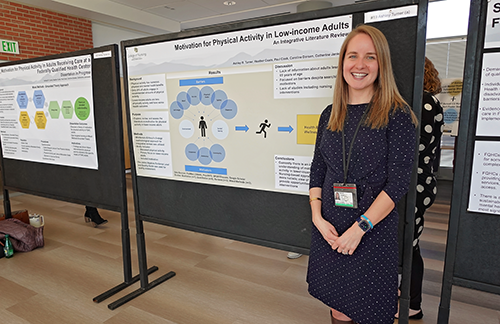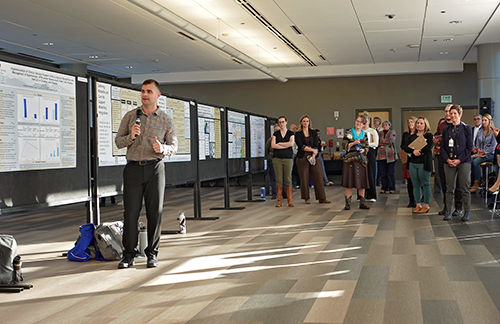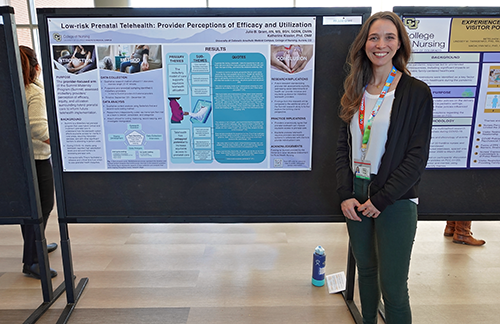Eighteen PhD students with CU College of Nursing had an opportunity to showcase their research to other PhD students and faculty. Their work was presented in a poster format during PhD Intensives Week, with key bullet points or graphs highlighting important information. Recent graduates from the college’s Psychiatric Mental Health Nurse Practitioner (PMHNP) program also presented their research.
They all had one goal: improving healthcare. The work of three students is highlighted below.
Telehealth Connections
|
CU Nursing PhD student Julie Grant, RN, MS, BSN, SCRN, CNRN, with her nursing communication poster. |
Julie Grant, RN, MS, BSN, SCRN, CNRN, is studying nursing communication and the patient-nurse relationship in the PhD program’s Caring Science track. For her dissertation, she is working with Assistant Professor of Research and Scholarship Katherine Kissler, PhD, CNM, on the perceptions of efficacy and utilization of low-risk prenatal telehealth.
Grant interviewed healthcare providers within the Summit Program, which is a long-term study looking at hybrid (virtual and in-person) prenatal care to improve telehealth services.
“What we found was that providers really did feel like this hybrid care for low-risk prenatal birthing clients could be equitable, as long we’re able to provide equitable resources,” she says. “For example, if we’re not able to provide everyone with the same blood pressure cup, then it becomes inequitable.”
Grant also discovered that telehealth visits could allow providers to form closer bonds with their patients.
“Providers weren’t just focused on providing physical care like they do when they’re in a clinic together,” she says. “They weren’t only focused on listening to a baby’s heartbeat. Providers and patients were interacting via video and were able to connect, talk about their health care goals, and the emotional situations during pregnancy, so it became more about a bond than just listening to the baby’s heart.”
2024 CU Nursing Student Poster Session Winners |
|
PhD students not presenting were required to participate by judging each poster and presenter. They chose three winners – the highest-scoring student from each cohort – and each received a $100 Amazon gift card. The 2024 CU Nursing Student Poster Session Winners were:
|
Grant says patients seeking midwifery care want that connection. Providers she interviewed said clients sought out their clinics because they wanted hands-on care.
“When they say ‘hands-on care’, the patients didn’t have providers put their hands on their bellies all the time. They mean the connection we make in terms of coming up with a birth plan and making the emotional connection, so they feel not only mentally prepared for the birth but physically prepared as well.”
The next steps include interviewing patients who are taking part in the study. Grant will get their perspective on what were the benefits or drawbacks of hybrid prenatal care.
“We really want to find out how to make hybrid prenatal care work so we can provide better access to care,” she says. “It’s really important, especially for people who have trouble getting to clinics, people in rural areas, or people with jobs that make it hard to keep daytime appointments. We want to make getting care easier and less financially straining.”
Motivating People to Stay Active

CU Nursing PhD student Ashley Turner displays her poster for motivation for physical activity. |
Ashley Turner is a PhD student in the Bio-behavioral Sciences track. She focused on motivation for physical activity in low-income adults and adults getting care at a federally qualified health center.
“I’ll be doing quantitative surveys and qualitative interviews, then take that information and create a theory or a detailed understanding of what motivates people to be active,” she says. Turner wants to find out what motivates people to stay active.
“I’m trying to find out what could motivate people and then create avenues to help them,” she says. “If a patient had diabetes and their diabetes is getting worse, they might say ‘show me data that would help and I’ll start walking’, so someone might be motivated that way. Or, someone might say they’re intimidated by going to the gym. I can tailor my education as a provider to give them some exercise apps to use and download.”
Turner has worked as a nurse practitioner for several years, focusing on low-income adults, and treating patients with chronic diseases like diabetes or hypertension. She says staying active is one way to help treat those chronic illnesses.
“How can we get our patients motivated to stay physically active?” she says. “We know lower-income adults have higher mortality rates and lower rates of physical activity. I feel like it’s our job as medical providers to encourage physical activity.”
Turner’s goal is to publish physical activity intervention techniques based on data she collects from patients. She wants clinicians around the U.S. to have this information so they can suggest these techniques to their patients.
“My goal is to get people out there and moving,” she says.
Increasing Access to Mental Health Services

Recent CU Nursing graduate Alan Reed, MSN, NP-C discusses his poster with other students and faculty. |
Alan Reed, MSN, NP-C, works in healthcare leadership and graduated with a Psychiatric Mental Health Nurse Practitioner degree in December.
He realized it can be a challenge for people struggling with their mental health to get services in one place, so he started looking into models of care where a primary care provider can provide as much care as possible.
“I wanted to look at the idea of sustainable integrated care – meaning behavioral health and primary care – in federally qualified health centers,” he says. “I looked at a model from the University of Washington, and most places have implemented that with grant funding or other funding, but it’s not often sustainable.”
Reed did some financial modeling and admitted it would be difficult to implement due to reimbursement regulations, so he is still looking into the financial impact.
“Right now, we brought in a psychiatrist and we are modeling financially where the break-even point is,” he says. “The psychiatrist does 50% of his time in direct patient care, and the other 50% is consultations with patients. But it doesn’t look financially sustainable that way, so we’re testing it out to find where the break-even point is.”
His research had some recommendations to make the program viable, including having federally qualified health centers experiment with their own models of care to increase access, having nurses stay informed about evolving healthcare models to advocate for patients and their communities and increasing cost-effective and high-quality nursing care.
“My goal is to figure out how do we implement something like this so health centers don’t have grant funding for only two years. Instead, they have the grant forever.”

Events from CU Nursing's PhD Intensives Week included poster presentations, guest speakers, and a welcome breakfast. |




